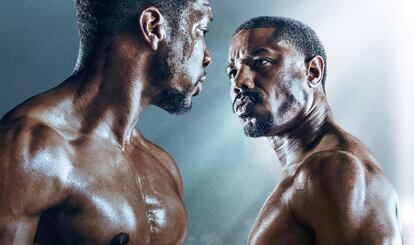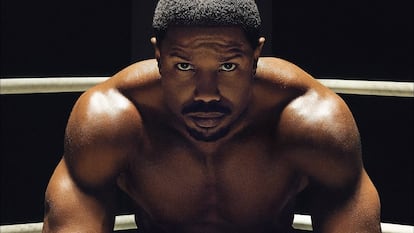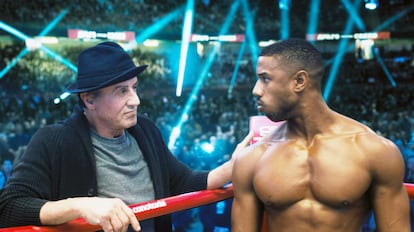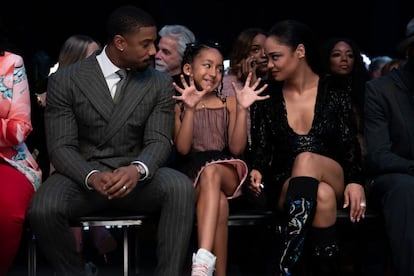‘Creed III’ knocks out new audiences with Rocky’s old gloves
Each installment of the new boxing saga has earned more money than the last, revitalizing Sylvester Stallone’s classic

On March 28, 1977, the 49th Academy Awards were held at the Dorothy Chandler Pavilion in Los Angeles. Rocky — a small production with a budget of barely $1 million — ended up winning the Oscar for Best Picture, defeating four highly formidable adversaries: Taxi Driver, Network, Bound for Glory and All the President’s Men.
On stage, the film’s two producers — Irwin Winkler and Robert Chartoff — wore black suits and bow ties. They thanked the Academy for the award… while flanking a silent, dishevelled Sylvester Stallone, who wore an open white shirt with long peaks, his chest exposed.
Although he didn’t know it yet, Stallone — the movie’s screenwriter, protagonist and promoter — would go down in history as a symbol of popular cinema. Typically, actors don’t collect the award for Best Picture (the producers usually do it), but Winkler had grabbed him and forced him to accompany them onstage.
None of these men could imagine that, 46 years after that triumphant night, the film would become a franchise of nine instalments, full of deaths and resurrections. Less so that Winkler and Stallone would get into a fight over the legacy of what such a work meant and continues to mean, both in a financial and sentimental context.
Over the years, the essentiality of the main character and his setting has changed. The concept has veered away from the prototype of the working-class white man, living amid the resentment that the working class felt during the Vietnam War, to 21st century African-American culture, in all of its extensions: social, political, economic, cultural, sports and musical.

Creed III is the third installment of the spin-off dedicated to the son of Rocky’s most famous rival, Apollo Creed. This idea came about after the conclusion of five Rocky movies starring (and sometimes directed by) Stallone. On its opening weekend at the start of March, it set a box office record for the entire franchise, pulling in $58 million. Creed made $29.6 million during its opening weekend in 2016, while Creed II took $35.5 million in 2018.
These figures — which have grown at an unusual speed — speak to the popularity of a series that, for the moment, doesn’t seem to have an end in sight, despite the clashes between Stallone, 76 and Winkler, 93, outside the ring.
While the two men have attacked each other on social media, they haven’t gone to war in court. This is because the actor has few legal options, as he was never financially in control of the character he played. While his salary rose with each of his performances or directorships, he never owned the franchise. In fact, Creed III is the first film in the series in which Stallone doesn’t appear… although his character is reverently quoted in a couple of dialogues.

After the very worthy revitalization of the saga in 2006 — with the nostalgic punch of Rocky Balboa – the new Creed saga added the value of reaching other cultures, races, generations and social spheres, while still maintaining the discourse of nobility, dreams, redemption… and the dignity and courage of its maker.
Respect is perhaps the word that is repeated most often in the series: respect for oneself and for what has been achieved in life, as well as respect for what others have given us.
In this sense, the storylines and the characters merge with the extra-cinematographic factors, reminding the viewer of what was achieved by Stallone… but also by Winkler, in spite of their disputes.
The inspiring tale of the little guy’s rise to glory continues to swarm around Creed III. The plot is framed by the protagonist’s dark past, which returns to settle scores with the retired millionaire that he is today. Meanwhile, there is a link to some of the subtexts from the 1976 film: those related to a boxer experiencing a decline in life, who suddenly has a unique and surely impossible chance to be a champion, both in life and in sport.
With a classic touch stemming from fables such as The Prince and the Pauper, the film grapples with the very different lives of the protagonist — played by Michael B. Jordan — and his supporting actor, Jonathan Majors. Majors plays a childhood friend of the lead, recently-released from jail after 18 years.
Directed by its charismatic actor in a heart-racing behind-the-camera debut, Creed III is, like its two predecessors, pure Black culture and community. And that twist — which still manages to keep the essence of the original films, such as the rough Italian neighborhood, reminiscent of The Godfather and The Sopranos — is fascinating.
The protagonist’s wife — an African-American singer — is played by Tessa Thompson. This adds a new musical element, with soundtracks integrated into the stories. There are big rap names in the film, including Childish Gambino (Donald Glover), Meek Mill, Jhené Aiko and the producer and singer, Mike Will Made It. The style of filming the boxing scenes in the Creed III is similar to HBO’s pay-per-view broadcasts, while DAZN sports streaming is featured, making for a more modern narrative. This is all bringing new audiences and generations into the myth of Rocky.

During the 1976 Oscars, when John G. Avildsen picked up the award for Best Director — defeating legends such as Alan J. Pakula, Sidney Lumet and Ingmar Bergman — he said that many people have given him things in life… but that Stallone had given him “his guts and his heart and his best shot.”
And, before everyone’s praise — and after a thankful silence — Sylvester Stallone, convinced that he had made a movie for the people, concluded in the last sentence of the ceremony: “And to all the Rockys in the world, I love you.”
Sign up for our weekly newsletter to get more English-language news coverage from EL PAÍS USA Edition
Tu suscripción se está usando en otro dispositivo
¿Quieres añadir otro usuario a tu suscripción?
Si continúas leyendo en este dispositivo, no se podrá leer en el otro.
FlechaTu suscripción se está usando en otro dispositivo y solo puedes acceder a EL PAÍS desde un dispositivo a la vez.
Si quieres compartir tu cuenta, cambia tu suscripción a la modalidad Premium, así podrás añadir otro usuario. Cada uno accederá con su propia cuenta de email, lo que os permitirá personalizar vuestra experiencia en EL PAÍS.
¿Tienes una suscripción de empresa? Accede aquí para contratar más cuentas.
En el caso de no saber quién está usando tu cuenta, te recomendamos cambiar tu contraseña aquí.
Si decides continuar compartiendo tu cuenta, este mensaje se mostrará en tu dispositivo y en el de la otra persona que está usando tu cuenta de forma indefinida, afectando a tu experiencia de lectura. Puedes consultar aquí los términos y condiciones de la suscripción digital.









































